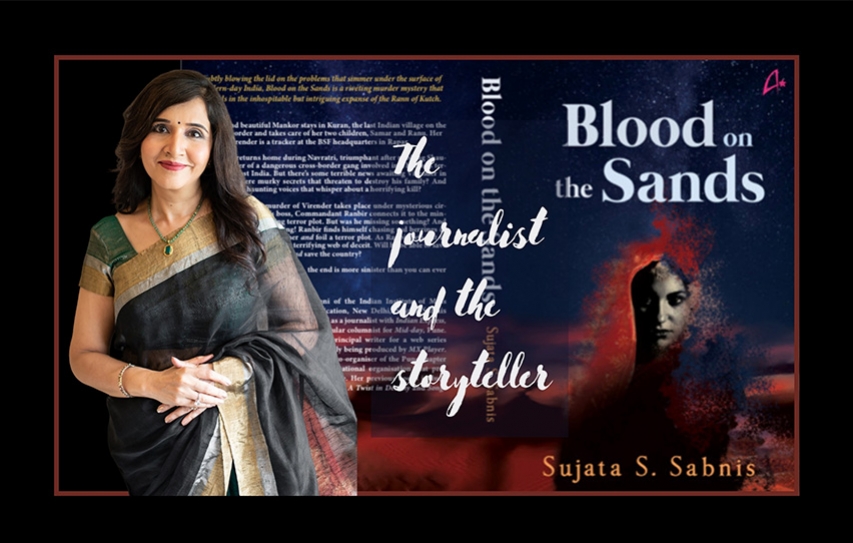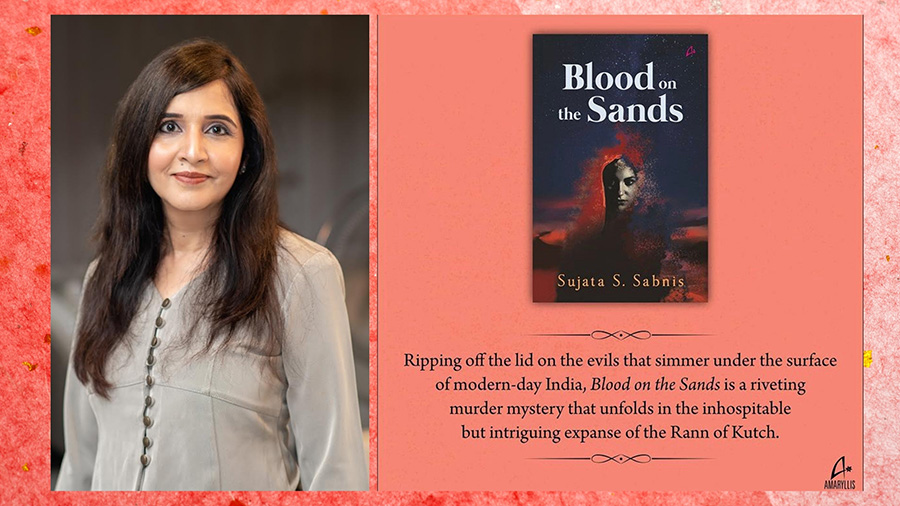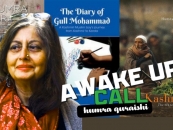
The Journalist and the storyteller: Sujata S Sabnis
by Vinta Nanda December 3 2020, 12:02 am Estimated Reading Time: 5 mins, 3 secsEverybody is talking about Sujata S Sabnis’ latest book Blood on the Sands, writes Vinta Nanda
An alumnus of the Indian Institute of mass communication, New Delhi, Sujata S Sabnis has worked as a journalist with the Indian express, Pune and as a regular columnist for Mid-Day, Pune. Her earlier three novels are Silent Whispers, A twist in destiny and Songs of Stone. She is the principal writer for a web series that is currently being produced by MxPlayer. As a part of ‘Ehsaas’, a women’s empowerment initiative of the Prabha Khaitan Foundation, she organizes events in Pune.
A friend told me about Sujata and I asked him to introduce me to her. I like to talk to writers – for some reason it makes me feel good. I don’t know how to articulate this perfectly but whomsoever connected to the literary world I meet makes me feel that all is okay with our world. As long as we have the vocabulary to express human abilities and flaws, I believe we will survive all the evil that persists upon us and also all the damage that it leaves behind after it has passed.
So, here I am, reproducing the short conversation that I had with Sujata. And, following that is the synopsis of her latest book and a small excerpt as well.
What inspired you to write this book?
The inspiration came from my daughter Siya actually. I was upset about something and Siya comes offering a head massage, a cup of tea and a hug. This little moment of care started a rapid chain of thoughts, which culminated in an idea that made me sit up. I had thought of a story, which was so painful that I couldn’t stop crying. That is when I knew that I had something powerful. That is when I decided this story had to reach people to shake them up.
Why is writing dear to you? Where did it start and how have you evolved as an author over your last works?
I discovered that I could write fiction while working as a journalist with Indian Express, Pune. Before I discovered that I could write, my persona was amorphous, with no real goal, nothing well defined. It was my writing that grew my inner power, strengthened my perceptions and confidence.
As an author, one always - but always - has to evolve if one wants to stay relevant. With each novel as well as screenplays, I have learnt from past mistakes. Now I am better at developing characters, detailing my stories and balancing between depth and pace. The process goes on ad infinitum.

Tell me about the process you followed, and what it took for you to get this one published?
I had a beautiful strong plot all ready but it was skeletal at this point. Now I needed background and detailing to give it form. I did some research and discovered that the inhospitable, intriguing Rann of Kutch would provide the best framework for this story. So I went there and stayed for a few weeks to do my research. Rann gave my story so much - framework, details, layers and color.
As for publishing, I knew it was a strong subject and difficult to fit today’s trend for lightweight novels. But Amaryllis publication, which had published my earlier novel, loved the story and accepted it.
A brief synopsis of Blood on the Sands:
Ripping off the lid on the evils that simmer under the surface of modern day India, ‘Blood on the sands’ is a riveting murder mystery that unfolds in the inhospitable but intriguing expanse of the Rann of Kutch.
Quiet and beautiful, Mankor stays in Kuran, the last Indian village on the Indo-Pak border with her two children, Samar and Ranu. Her husband Virender is a tracker at the BSF headquarters in Rapar.
Virender returns home during Navratri, triumphant after nabbing Shaukat, a member of a dangerous cross-border gang involved in a terror plot against India. But there is some terrible news awaiting Virender in Kuran. Are there murky secrets that threaten to destroy his family? And what are those haunting voices that whisper about a horrifying kill?
When a brutal murder takes place under mysterious circumstances, Virender’s boss, Commandant Ranbir, connects it to the minute-by-minute unraveling terror plot. But was he overlooking something? And then little Ranu goes missing. Ranbir finds himself chasing red herrings in a race against time to find her and foil a terror plot.
As chilling secrets stumble out, the end is more sinister than you can ever imagine.
An excerpt:
Cruel as the Rann of Kutch is, it cannot be as cruel as the human heart. Today the wind is whispering the story of a kill. It’s a story that can sear your mind and destroy your peace. For killing a human is a complicated thing. There is so much to kill. The primordial gut-wrenching instinct for survival has to be stamped out. The voice silenced, the live-wire energy doused, the desperation for the next breath strangled... And then, once the deed is done, to remove all traces of existence of that human being - the bones, the blood, the fragments of skin, the intensity of the eyes, the still heart, the clenched gut, the small bits and pieces that wrap up that which is at the core, the soul, the spirit.
And therein lies the problem - the soul is not that easy to kill. The spirit has its own ways of escaping the ravaged and destroyed house... It hangs heavy in the air, a scrap of energy fleetingly felt. And just as silently, it demands justice, demands retribution at the life taken away before its time.
Published by: Amaryllis publication
Available at Amazon:
https://www.amazon.in/Books-Sujata-S-Sabnis/s?rh=n%3A976389031%2Cp_27%3ASujata+S.+Sabnis




-173X130.jpg)
-173X130.jpg)

-173X130.jpg)
-173X130.jpg)


